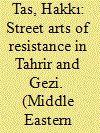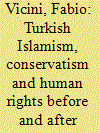| Srl | Item |
| 1 |
ID:
152448


|
|
|
|
|
| Summary/Abstract |
The third-term policies of the AKP (Justice and Development Party) in Turkey posed new challenges for observers: do top-down Islamization policies and the increasing pan-Islamist tone in Turkish foreign policy signify a return to Islamism or is a new amalgamation in the making? In this case, is ‘post-Islamism’ now dated as an analytical tool to characterize the AKP’s new ideological formation or was it always a misnomer? Drawing on el-Affendi’s (2008) distinction between the Medina and Damascus models and observing the new Islamic opposition to the AKP policies, its post-2011 ideological configuration will be analyzed with reference to an antinomy of Islamism vs. Muslimism. Muslimism, an extension of Damascus model, is a quest for power and seeks Muslim interests worldwide. Islamism, an heir to Medina model, may be characterized by an ethical pursuit of justice that occasionally clashes with Muslim political interests.
|
|
|
|
|
|
|
|
|
|
|
|
|
|
|
|
| 2 |
ID:
153594


|
|
|
|
|
| Summary/Abstract |
With the tremendous visibility of popular mobilization in the last decade, scholars have increasingly directed their attention to the streets to examine the dynamics of power and resistance. Among emerging venues of politics, this study examines street art and graffiti as a performance of resistance in the 2011 Tahrir Revolution and 2013 Gezi Protests in Egypt and Turkey, respectively. As re-appropriation of the urban landscape and modes of self-expression, street art and graffiti lie at the intersection of politics, space, and identity. Inspired by James C. Scott's concept of ‘arts of resistance’, this study takes up these ‘street arts of resistance’ as revealing the hidden transcript, namely, the self-disclosure of subordinates under the politics of disguise. While unpacking that subversive power, this study rests on its claim that street art and graffiti not only seek to represent, but also to perform and interject. Thereafter, it examines how these modes of visual culture interrupt time, space, and the self, along with their respective effects.
|
|
|
|
|
|
|
|
|
|
|
|
|
|
|
|
| 3 |
ID:
161480


|
|
|
|
|
| Summary/Abstract |
Focusing on Mazlumder, an Islamist human rights organization, the paper sheds light on the complex articulation of Islamism and human rights discourse in post-2002 Turkey. Based on fieldwork and on the analysis of the organization’s press releases and reports on controversial public issues such as the Gezi protests, the paper argues that Mazlumder’s effort should not be read through normative lenses that reduce the issue to a matter of compatibility between Islam and human rights, and suggests that the analysis should instead take into account the positional shifts of the conservative front in relation to recent internal and external turmoil.
|
|
|
|
|
|
|
|
|
|
|
|
|
|
|
|